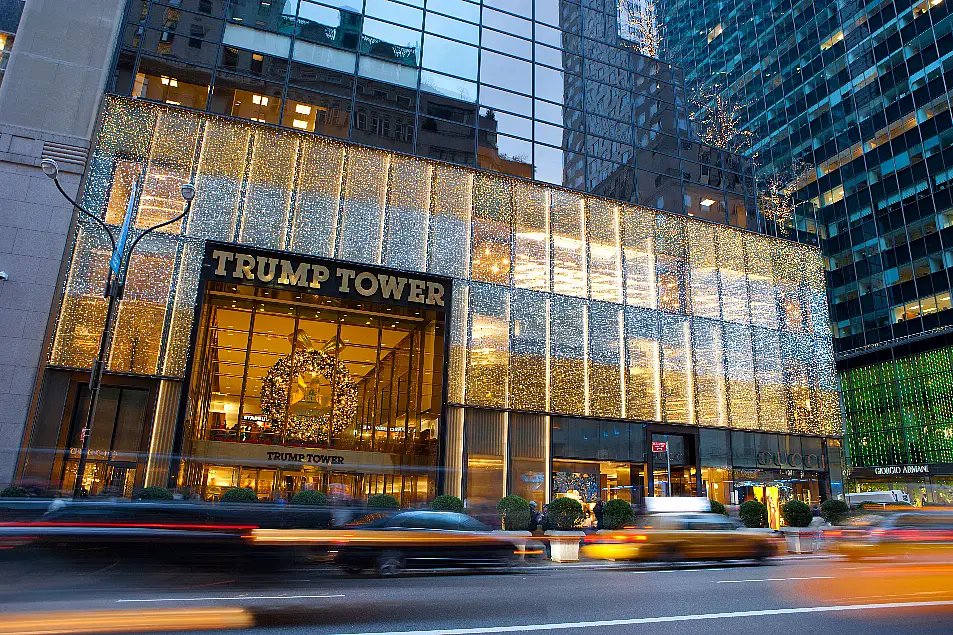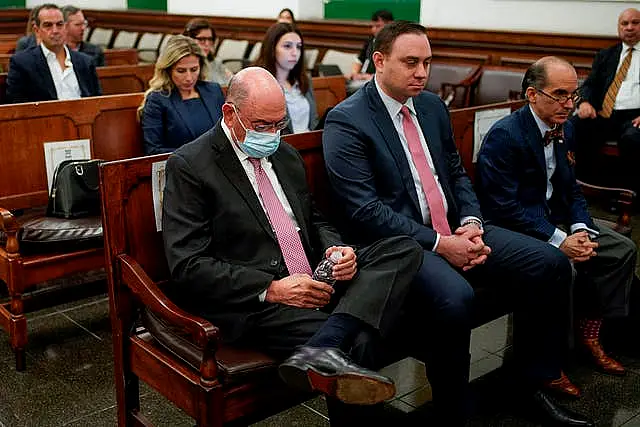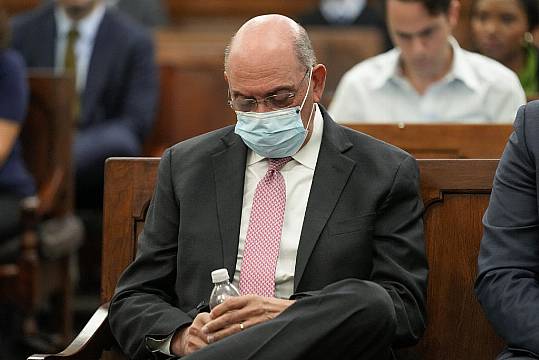Donald Trump’s longtime finance chief Allen Weisselberg was giving evidence on Tuesday in the civil trial in New York Attorney General Letitia James’ fraud lawsuit against the Republican former president and his company.
It comes after Weisselberg served time in jail for tax fraud.
Weisselberg helped spare Mr Trump’s real estate empire from its last existential threat, staving off insolvency after casino bankruptcies and an airline failure in the 1990s.
Weisselberg, a defendant testifying as a prosecution witness, was giving evidence about his role in preparing Mr Trump’s annual financial statements — including conversations they had while finalising the documents, which were given to banks, insurers and others to make deals and secure loans.
Evidence shown on Tuesday shows Mr Trump signed a document 30 years ago that gave the true size of the New York penthouse that was later listed as far larger on his financial statements.

The evidence appeared in an email attachment shown as Weisselberg.
The attachment was a 1994 document, signed by Mr Trump, that listed his Trump Tower triplex at 10,996 square feet — not the 30,000 square feet later claimed for years on financial statements that were given to banks, insurers and others to make deals and secure loans.
Weisselberg said he recalled seeing the email but not the attachment, explaining that the attachments were documents he already had on file in the company’s offices. But in any event, he said, he did not pay much attention to the apartment’s size because its value amounted to a fraction of Mr Trump’s wealth.
“I never even thought about the apartment. It was de minimis, in my mind,” Weisselberg said.
“It was not something that was that important to me when looking at a six billion, five billion net worth.”
Weisselberg said he learned of the discrepancy only when a Forbes magazine reporter pointed it out to him in 2016. The former finance chief testified that he initially disputed the magazine’s findings but said he could not recall whether he directed anyone to look into the matter.
“You don’t recall if you did anything to confirm who was right?” state lawyer Louis Solomon asked.
Weisselberg said he could not recall.
As Forbes asked about the apartment size question in 2017, emails show, a company spokesperson told another Trump executive that they were not to engage on the size issue. A week later, Mr Trump’s 2016 financial statement was released, using the incorrect square footage.

Ms James’ lawsuit alleges that Weisselberg engineered Mr Trump’s financial statements to meet his demands that they show increases in his net worth and signed off on lofty valuations for assets despite appraisals to the contrary. Mr Trump denies any wrongdoing.
Mr Trump, who attended the first three days of the non-jury trial last week in Manhattan, is not expected to return to court to see his former chief financial officer testify.
An appeals court rejected Mr Trump’s bid on Friday to halt the trial while he fights a pre-trial ruling that could strip him of control over Trump Tower and other properties.
Weisselberg has lain low since leaving a New York City jail six months ago after serving 100 days for dodging taxes on 1.7 million dollars (£1.4 million) in job perks, including a Manhattan apartment, luxury cars for him and his wife and his grandchildren’s school tuition.
“Over the last number of months, it’s been, I’m sure, well-documented and well-known that I’ve been through quite a bit,” Weisselberg testified in a May deposition in the civil case.
Weisselberg, 76, testified that he was having trouble sleeping, started seeing a therapist and was taking a generic form of Valium as he tried to “reacclimate myself back to society”.
“It’s been a traumatic and difficult time for myself and my family,” Weisselberg told lawyers in the room, including James, according to a deposition transcript made public last month.
“After a long, what I considered a very quiet business — a job that I had over all these years — to be thrown into this situation has had a traumatic impact on my day-to-day life and my family’s life,” Weisselberg said.
Weisselberg has not given interviews or commented publicly since leaving jail.
Mr Trump, in his deposition in April, said of his former lieutenant: “He was with me for a long time. He was liked. He was respected. Now, he’s gone through hell and back. What’s happened to him is very sad.”
Jeffrey McConney, the Trump Organisation’s longtime controller, testified at the civil trial on Friday that Weisselberg asked him to assist him in committing tax fraud on multiple occasions, including changing payroll records to hide perks and giving his wife a check for a no-show job so she could qualify for social security benefits.

Those allegations, which were also at the heart of the Trump Organisation’s criminal conviction last year, are not part of the civil case. Mr McConney said he helped Weisselberg because he feared being fired if he refused.
In a pre-trial ruling last month, Judge Arthur Engoron found that Mr Trump, Weisselberg and other defendants committed years of fraud by exaggerating the value of Mr Trump’s assets and net worth on his financial statements.
As punishment, Judge Engoron ordered that a court-appointed receiver take control of some Trump companies, putting the future of Trump Tower and other marquee properties in doubt. An appeals court on Friday blocked enforcement of that aspect of the judge’s ruling, at least for now.
The civil trial concerns allegations of conspiracy, insurance fraud and falsifying business records. Ms James is seeking 250 million dollars (£204 million) in penalties and a ban on Mr Trump doing business in New York.
At his May deposition, Weisselberg recalled how Mr Trump would sometimes underline or write a question mark next to values he disagreed with and would quibble about the language the financial statements used to describe his properties.
“I might say beautiful. He might say magnificent,” Weisselberg testified. “I might say it was cute. He would say it’s incredible.”
Weisselberg’s association with Mr Trump’s family dated to 1973, when he answered a newspaper ad for a staff accountant for Mr Trump’s real estate-developer father, Fred, who owned New York City apartment buildings. He started working for Donald Trump in 1986. In his final years, he made 1.14 million dollars (£900,000) a year in salary and bonuses.
Weisselberg’s tax fraud case hastened his exit from the company. According to a severance agreement he signed the day before going to jail, Weisselberg is due to be paid two million dollars (£1.6 million) in eight quarterly installments.
That sum is close to the amount of back taxes, penalties and interest he was required to pay as part of his plea agreement.
So far, according to a payment schedule included with the agreement, Weisselberg has received 750,000 dollars (£612,000) in severance.
Separately, prosecutors are urging the judge overseeing Mr Trump’s election interference case in Washington to take steps to protect the privacy and identity of prospective jurors.
The prosecutors on Tuesday cited the former president’s “continued use of social media as a weapon of intimidation in court proceedings”.
Special counsel Jack Smith’s team said in court papers that they are concerned about what Mr Trump “may do with social media research on potential jurors” in the case accusing the former Republican president of illegally plotting to overturn his election loss to Democrat Joe Biden.
John Lauro, a lawyer for Mr Trump, did not immediately return a message seeking comment but the government’s motion indicates that his defence opposes it.
Mr Trump denies any wrongdoing.







